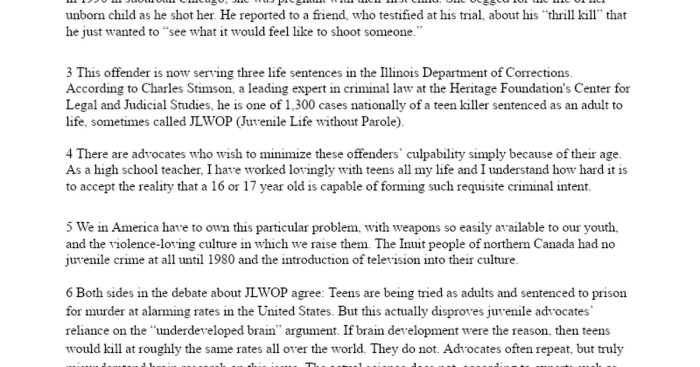Jennifer bishop jenkins on punishment and teen killers – Jennifer Bishop Jenkins’ groundbreaking work on juvenile justice, particularly her focus on punishment for teen killers, has sparked a crucial debate on the complexities of this issue. Her research and theories challenge traditional approaches, emphasizing the significance of developmental and social factors in determining appropriate punishments and exploring alternative models that prioritize rehabilitation and accountability.
This comprehensive analysis delves into Jenkins’ perspective, examining the effectiveness of traditional punishments, exploring alternative models, and balancing justice and mercy in punishing teen killers. It also highlights the societal factors that contribute to teen violence and homicide, emphasizing the need for comprehensive social programs and community initiatives.
Introduction to Jennifer Bishop Jenkins’ Perspective on Punishment for Teen Killers: Jennifer Bishop Jenkins On Punishment And Teen Killers

Jennifer Bishop Jenkins, a renowned criminologist and expert on juvenile justice, has dedicated extensive research to the topic of punishment for teen killers. Her work centers on understanding the developmental and social factors that influence teen violence and homicide, as well as evaluating the effectiveness of traditional and alternative punishment models.
Jenkins argues that traditional approaches to punishing teen killers, such as incarceration and the death penalty, have proven ineffective in deterring future crimes and rehabilitating offenders. She advocates for alternative punishment models that focus on rehabilitation, accountability, and victim support.
Understanding the Developmental and Social Factors Influencing Teen Killers
Jenkins emphasizes the importance of considering the developmental and social factors that contribute to teen violence and homicide. These factors include:
- Cognitive and emotional immaturity
- Exposure to violence and trauma
- Poverty and inequality
- Lack of opportunity and support
Jenkins argues that these factors can significantly impair a teen’s ability to make rational decisions and control their impulses, increasing their risk for engaging in violent behavior.
Evaluating the Effectiveness of Traditional Punishments for Teen Killers
Traditional approaches to punishing teen killers, such as incarceration and the death penalty, have been shown to be largely ineffective. Incarceration can expose teens to further violence and abuse, while the death penalty is irreversible and raises serious ethical concerns.
Research has consistently shown that incarceration does not deter future crimes and may actually increase the likelihood of recidivism. The death penalty has also been found to be racially biased and fails to provide closure or healing for victims’ families.
Exploring Alternative Punishment Models for Teen Killers, Jennifer bishop jenkins on punishment and teen killers
Jenkins proposes alternative punishment models that prioritize rehabilitation, accountability, and victim support. These models include:
- Restorative justice: Focuses on repairing harm caused by the crime through victim-offender mediation, community service, and other restorative practices.
- Community-based interventions: Provide support and supervision for teen offenders within their own communities, emphasizing education, job training, and mental health services.
These models aim to address the underlying factors that contribute to teen violence and provide opportunities for offenders to take responsibility for their actions and make positive changes in their lives.
Balancing Justice and Mercy in Punishing Teen Killers
Punishing teen killers involves balancing justice for victims with mercy for young offenders. Jenkins argues that both justice and mercy are essential for a just and effective criminal justice system.
Justice requires holding offenders accountable for their actions and ensuring that victims receive compensation and support. Mercy recognizes the unique developmental and social challenges faced by teen offenders and allows for opportunities for rehabilitation and redemption.
The Role of Society in Addressing Teen Violence and Homicide
Jenkins emphasizes the importance of society in addressing the root causes of teen violence and homicide. She argues that poverty, inequality, and lack of opportunity contribute to the cycle of violence.
To effectively reduce teen violence, Jenkins recommends investing in social programs that provide education, job training, and support services for at-risk youth. She also advocates for addressing the underlying social and economic conditions that perpetuate poverty and inequality.
Helpful Answers
What are the key arguments of Jennifer Bishop Jenkins on punishment for teen killers?
Jenkins argues that traditional punishments, such as incarceration and the death penalty, are ineffective in deterring future crimes and rehabilitating offenders. She emphasizes the importance of considering developmental and social factors when determining appropriate punishments and advocates for alternative models that focus on rehabilitation, accountability, and victim support.
How does Jenkins balance justice for victims with mercy for young offenders?
Jenkins believes that it is possible to balance justice and mercy by finding punishments that hold offenders accountable for their actions while also providing opportunities for rehabilitation. She advocates for a balanced approach that promotes both accountability and the possibility of redemption.
What are some of the societal factors that contribute to teen violence and homicide?
Jenkins identifies poverty, inequality, and lack of opportunity as key societal factors that contribute to teen violence and homicide. She argues that addressing these issues through social programs and community initiatives is crucial for preventing teen violence and creating safer communities.

